
David Gregory's new documentary - Blood & Flesh: The Reel Life & Ghastly Death of Al Adamson - has a killer hook. Basically, ever hear the one about the horror director who died like one of the characters from his movies? That, sadly, happened to Al Adamson. Don't you kind of want to know the details? How'd he die, exactly? Who killed him and why? And what, if anything, does this have to do with aliens?
Blood & Flesh delivers all of that in due time, but Gregory's background as one of the world's leading distributors of cult and underground films - he co-launched home video labels Blue Underground UK and Severin Films - means he has a real love for the material and the colorful behind-the-scenes characters. He legitimately loved Adamson's Dracula vs. Frankenstein as a child, and as part of his work on Blood & Flesh he restored countless other Adamson's oddities and is now selling them through Severin. Blood & Flesh - currently available to rent or buy on digital outlets like Vudu - is most directly an advertisement for that Al Adamson box set.
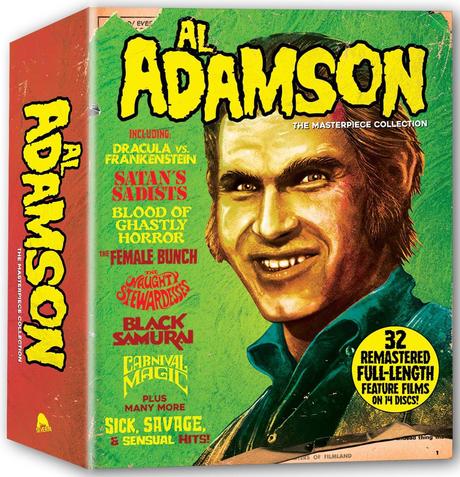
Blood & Flesh stands entirely on its own, though, as a perfect mixture of two very familiar, but usually separate things: a cradle-to-crave doc that uses talking-head interviews and movie clips to highlight every major work of a filmmaker's career AND a true crime story featuring shady characters, sinister motivations, and a grizzly end.
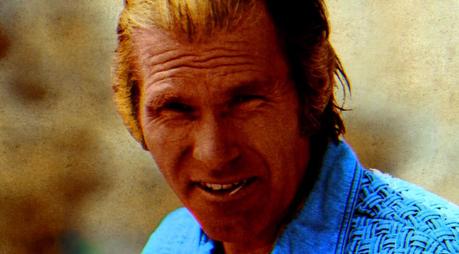
When Al Adamson died in 1995, Cinefantastique - arguably the premiere horror/fantasy/science-fiction magazine at the time - could only muster a 62-word obituary:
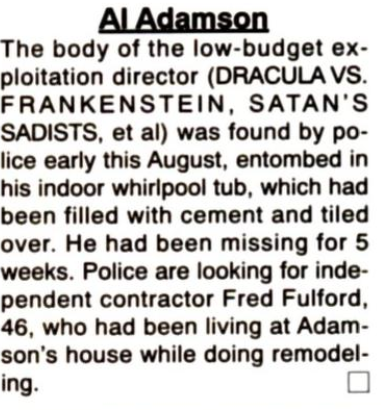
It wasn't necessarily a slight on their part toward Adamson's career. It's just, Adamson was always a sub-Roger Corman type, plying the same trade as the schlock master but doing things cheaper, quicker, and with less talent. (That's saying a lot when compared to Corman's notoriously tightfisted producing style.) An Al Adamson movie was the No. 2 feature a drive-in would play when a Corman title wasn't available.
By 1995, however, the drive-ins were long dead and Adamson hadn't directed anything in over a decade, closing out his movie career with a couple of bizarre family films ( Carnival Magic, Lost) before retiring to focus on the real estate business. So, when he died he didn't get the two-page, career retrospective treatment. He got a little blurb bluntly detailing the rather macabre way he exited this world.
Cinefantastique wasn't alone. Many publications at the time sidelined the details of Adamson's career in favor of highlighting the irony of a horror director dying in a scenario - buried under concrete - that could have been ripped out of one of his movies. Indeed, the story became a bit of sensation on TV news at the time, with many a local anchor spinning their best pun about art imitating life.
A manhunt ensued, an arrest was made, and the related trial dragged on for years. The convicted killer was still awaiting sentencing when David Konow's book Schlock-O-Rama: The Films of Al Adamson was published in 1998. Eventually, though, the world moved on, and Adamson drifted into obscurity - remembered by some for the way he died, admired by a select few B-movie advocates, but mostly forgotten by the general film-loving population.
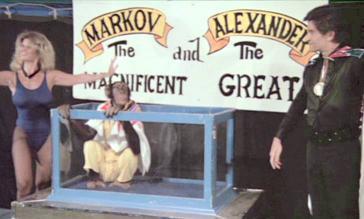
Candidly, I'd never even heard of the man until Mystery Science Theater 3000 included Carnival Magic in its first rival season on Netflix a couple of years ago. Jonah and the bots had a field day with the film, deservedly so since Carnival Magic mostly involves a barely trained chimp - nicknamed Alexander the Great - always stopping just short of attacking his human co-stars.
The film was - you learn in Blood & Flesh - a Hail Mary effort from Adamson to leave the exploitation circuit behind and transition into family film knockoffs, but being an Al Adamson production, everything was done on the cheap. The chimp they got had aged out of active use in an actual circus and was indeed quite frequently dangerous to be around, a bit odd since Alexander the Great is so often on screen in Carnival Magic opposite Regina Carrol, Adamson's longtime wife. Beyond that, those who worked on Carnival Magic reveal the film's big hook - Alexander can talk! - was added entirely in post. That was never a part of the story when they were working on the film. Adamson just improvised it.
By that point in the documentary, however, none of this registers as a surprise. Rather par for the course, really, for a filmmaker who used to splice minutes of new footage into his old movies and then re-release them with a new title and poster. Or for a director who frequently conned his crews into working for free- some of whom graduated into long, Oscar-winning careers, but most of whom did not - and would sometimes leave the set for an hour to go collect money from the people on his newspaper route, just one of his many side hustles.
Blood & Flesh entertainingly details all of that and always knows when to stop for a really good story from the trenches, as aged colleagues and friends reminisce about the crazy shit that went down on an Al Adamson movie set. Apart from some lingering bitterness over payment disputes, no one seems to have a bad thing to say about Adamson, the person. Plenty acknowledge his actual filmmaking was sub-Corman and maybe even sub-Ed Wood, but they loved working with him.
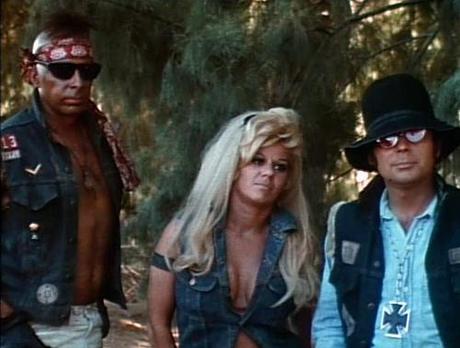
For example, Russ Tamblyn - an Oscar-nominee for Peyton Place (1957) and co-star in West Side Story (1961)- is interviewed and warmly recalls his performances in Adamson vehicles like 1969's Satan's Sadists and 1971's The Female Bunch. Even Roger Engel - who was a stockbroker before Adamson and producer Samuel Sherman convinced him to co-headline Dracula vs. Frankenstein - is a good sport about the movie that earned him the title of "worst Dracula ever," according to some polls.
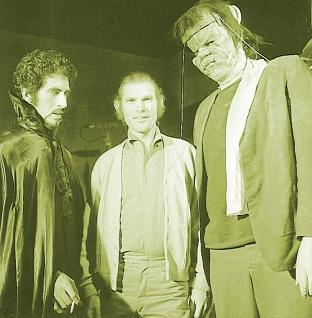
There are countless others, of course, who aren't around anymore to speak to their experience with Adamson. We're told that old-timers like Lon Chaney Jr., John Carradine, and J. Carrol Naish who frequented Adamson movies until the day they died were simply happy to be working again. When you see a throat cancer-stricken Chaney Jr., however, grunting his way through Dracula vs. Frankenstein because he couldn't speak anymore it's hard not to think back to Bela Lugosi dying halfway through the making of Ed Wood's Plan 9.
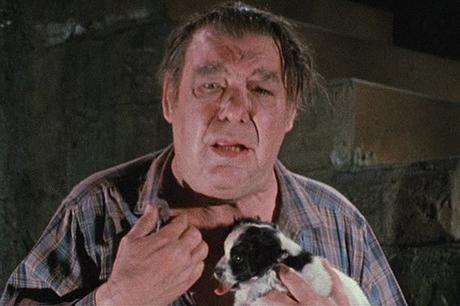
Indeed, much of what's detailed in Blood & Flesh's overview of Adamson's career will sound awfully familiar to anyone who's ever seen Ed Wood or prior documentaries like Corman's World: Exploits of a Hollywood Rebel and Electric Boogaloo: The Wild, Untold Story of Cannon Films. There are, after all, only so many variations on the "we didn't know what we're doing, had no money, and made everything up as we went along" stories so common to the B-movie industry.
I personally eat that up with a spoon, but the obvious challenge is to make that kind of feel new and sexy again. Those other docs had the benefit of charismatic, outlandish central figures. David Gregory's prior feature-length documentary - Lost Soul: The Doomed Journey of Richard Stanley's Island of Dr. Moreau - had the gift of Richard Stanley, an extraordinarily dynamic interview subject prone to casually referencing his good friend, the witch doctor.
Blood & Flesh doesn't have that. As stated by one of the interview subjects, Al Adamson was a remarkably ordinary guy. You see that in the archival Adamson interview Gregory stretches across the entire documentary. Sporting a polo and seated outdoors as the sun beats down on him, this version of Adamson could just as well be a retiree talking about his golf game than a B-movie veteran.
The man was hiding his quirk flag, though. When Blood & Flesh enters its second section and delves into Adamson's growing obsession with aliens after his directing career fizzled out, shit gets weird. It's enough that you're completely off-balance once the murder-mystery, true crime portion of the story kicks in. To say any more would ruin the fun of watching the documentary.
Gregory - who has directed literally hundreds of featurettes for older movies newly transferred DVD/Blu-Ray - knows how these behind the scenes retrospectives normally go, and they don't normally end with a grizzly murder. In fact, B-movie figures often die in relative obscurity. Al Adamson's death, by contrast, became a bit of a media sensation. It's a good story, but Gregory clearly hopes Blood & Flesh will help us appreciate the man who just wanted to make movies, not the man who ended up dead and buried under his own Jacuzzi.
Seriously, though, what's the deal with the aliens? Spoiler, did they kill this dude or not?
I rented Blood & Flesh: The Reel Life & Ghastly Death of Al Adamson on Vudu.

